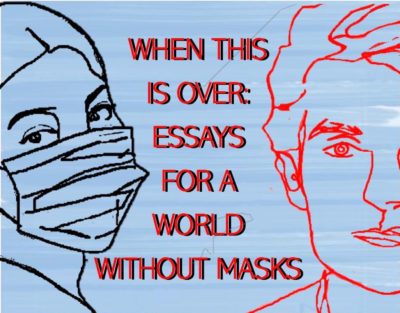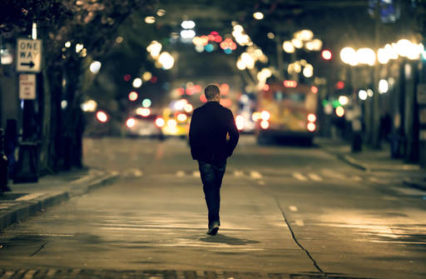Wales Arts Review asked some of Wales’s top writers to pen some thoughts on the future after Covid-19. This new series brings together a wide variety of perspectives and ideas in a vibrant array of styles and forms, expressing hopes for a new way of doing things when the Covid-19 coronavirus is finally overcome. Political, personal, sociological, ecological, cultural – this is an evolving tableau of ideas. Here, David Llewellyn reflects on the hardships of life as a writer and freelancer and hopes that the levels of support offered to the industry during Covid-19 will be continued still after the pandemic ends.
 It’s early on Saturday 4th April and I am dancing. Twenty-odd years ago I was probably doing much the same, except then it was to the strains of Get Get Down by Paul Johnson in Cardiff’s Hippo Club, my eyes like saucers, my face a rictus grin of pure joy. Now I am forty-two years old, bald, about four stone heavier, and I’ve had a good night’s sleep and a bowl of porridge, but I’m dancing my way down the middle of Newport Road like no-one’s watching. Because they aren’t.
It’s early on Saturday 4th April and I am dancing. Twenty-odd years ago I was probably doing much the same, except then it was to the strains of Get Get Down by Paul Johnson in Cardiff’s Hippo Club, my eyes like saucers, my face a rictus grin of pure joy. Now I am forty-two years old, bald, about four stone heavier, and I’ve had a good night’s sleep and a bowl of porridge, but I’m dancing my way down the middle of Newport Road like no-one’s watching. Because they aren’t.
We’re almost a fortnight into the UK’s belated response to Covid-19. Cafes, restaurants, pubs, schools, theatres, gyms, universities, galleries, museums, theme parks and the vast majority of shops are shut. Newport Road, usually busy at any hour, is deserted. To quote a well-known song and disaster movie cliché, “It’s the end of the world as we know it, and I feel fine.”
As recently as mid-February things were much bleaker. I’d been without work for several months. My rent and bills were in arrears, I was denied Job Seekers’ Allowance and qualified for no more than £200 a month Universal Credit. While “signing on” I couldn’t look for writing gigs, because the DWP looks at anything arts-based and freelance as if it were a 4,000-year-old Akkadian script. Copy and content writing jobs were few and far between, while retail and office jobs weren’t looking for a middle-aged candidate with 8 years of freelance writing on his CV. My depression – a frequent visitor for much of my adult life – was perhaps the worst it’s ever been.
On February 23rd my notebook tells me I visited my brother and his family, and that my father, who lives on the same street, popped by for a cuppa. “It did me good.” That was the last I saw of them, unmediated by a phone screen. Like many others, we all locked down over a week before the UK government and several days before the Stereophonics thought it necessary.
And then the strangest thing happened. Like the walls of Jericho, the world’s attempt at forcing me to quit writing and get a “proper job” or starve came tumbling down. The time-consuming business of looking for jobs that didn’t exist and employers who didn’t want me was over. No more weekly appointments at the Job Centre to make sure I was job-seeking. No more CV workshops and group sessions and career mornings.
By itself, my situation during Covid-19 could have remained bleak. No income, no-one to help me find work. But then offers of writing gigs began to appear in my inbox. Writers are the original homeworkers, and lots of people were furloughed and looking for things to keep them entertained, some of which had to be written. There were offers of support from organisations such as the Society of Authors, covering some of those arrears, giving me a chance to breathe. What’s more, given a genuine catastrophe to deal with, my brain kicked depression and anxiety to one side and kept them there, if only for a while.
It was a pandemic miracle.
This, I’m aware, is not an experience shared by all, least of all in the arts, where theatres, galleries, music venues and cinemas are shut, and where income and revenue were precarious at the best of times. Right now I know I’m lucky. The depression has come back once or twice – money in the bank and bigger things to worry about will never be a permanent cure – but it’s manageable.
Early on, as Rishi Sunak did his Oprah Winfrey act, showering the nation with gifts, I saw friends and acquaintances cheering him on. Hashtag Rishi 4 PM. Compared with Boris, they said, he was practically Disraelian in stature. As if this was in any way difficult to accomplish.
I was sceptical. I’d already seen how shambolically heartless the benefits system can be, how little sense of social responsibility the ruling party has when it’s not under intense scrutiny. And though it turned out that there is a Magic Money Tree (those of us old enough to remember the 2008 bank bailouts already knew this), it wasn’t long before that ruling party reverted to type.
“You’ve had your dose of socialism, now get back to the coalface. Capitalism is a jealous god, and if you betray him he will exterminate your loved ones.”
I have every sympathy for those eager to get back to work, for money or just something to do. Though the wisdom of ending the lockdown remains questionable at the time of writing, the experience must be entirely alien for so many. For me, it was more or less business as usual, better than usual in fact, and it was two months or more before I began to feel that acute melancholy I’d seen so many others talk about.
Now, over two months in, I wonder what the end of lockdown and the post-pandemic world might look like. Will the job offers carry on coming in at a rate that keeps me fed and housed? And if they don’t, will there be safety nets in place, ones tailor made for those who can be in and out of work, with and without funds, every few months. What I needed, at the beginning of this strangest of years, was some sort of valve, a means of accessing funds when I absolutely needed them. The system in which poverty incurs bank fees and late payment fees and cancellation fees that make it impossible to claw your way back to a place of safety is surely unsustainable.
The world before Covid-19 was one in which freelancers could wait 30 inexplicable days for payment, and benefit claims moved with all the urgency of glaciers. It was one in which the working lives of artists, freelancers and the self-employed were largely incompatible with anything the DWP has in place in times of need.
“On which date did you start working more than 16 hours a week?” the Job Centre asked, after I’d told them I was working on a few scripts and that they could end my claim, which they had turned down two months earlier without giving me a penny.
On which date? Do the days when I was scribbling notes and scratching my head and watching certain movies for inspiration count? How about that socially distanced walk around the nearest park to clear my head and gather my thoughts? As I strolled among the tulips and cherry trees I resolved a particularly tricky plot point, so can I claim that time as R&D? And how many hours? I get paid by the word not the hour, and there are 3pm lunches and 10pm finishing times not because I planned them but because I simply lost track of time while “in the zone” or racing towards a deadline.
Of course, all this is a tad solipsistic against a backdrop of mass unemployment, an approaching recession, and low-wage workers risking their lives to keep the country running. My partner, my rock whenever I fall to pieces, found the first few weeks of Covid-19 lockdown particularly tough. He lost his appetite, couldn’t sleep, couldn’t paint (he’d hoped time away from his day job might inspire endless creativity). My brother and his family were in isolation for several weeks when his wife, a district nurse, showed possible coronavirus symptoms. This, at a time when NHS staff weren’t being tested. Our landlord, a father of four whose letters regarding rent arrears were almost painfully generous, now finds himself out of work.
The human tragedy of the Covid-19 pandemic is almost impossible to fathom. Comparing it with earlier flu outbreaks and annual road deaths seems, at best, callous; the stuff of contrarian pundits and Twitter trolls. Tens of thousands of families are grieving, many more unable to visit loved ones in hospital or attend funerals. That we’re going through all this with such a mendacious, incompetent government adds, quite literally, insult to injury.
Any hopes of a Universal Basic Income during Covid-19 have been shot down by both of the main parties, but the benefits system as it exists is inflexible and prohibitive for anyone working in the arts. It’s hardly a surprise that so many branches of it are dominated by those who went to private schools. It’s difficult to be inspired, confident and creative when you’re worried about eviction or whether you can afford even the most basic groceries.
Writers’ earnings have plummeted in recent years; very few of us (only one, in fact) can be J.K. Rowling. Even with a near-infinite number of channels and streaming platforms the opportunities for new writers in TV and film, especially those from under-represented backgrounds, are limited. Familiar surnames (“Oh, that must be so-and-so’s son/daughter”) still haunt the credits. But that’s a discussion for another day.
I was never at the sharpest end of poverty, but money worries are exhausting. With a little money and peace of mind I’ve been more productive in recent months than I was for much of 2019. It shouldn’t have taken a global Covid-19 crisis for this to happen.
Can it last? I hope so, but I’ve been a Published Author™ for fourteen years, and I know nothing can be taken for granted. My father, a retired car mechanic, ran his own garage for almost a decade, having worked in factories and other garages since leaving school at 16. As an Art-School-Student and later Office-Worker-Who-Wrote-Occasionally I couldn’t talk to him about work. For him, an art school and a call centre were as remotely mysterious as CERN or the International Space Station. When I went freelance I could finally talk about my work in ways he understood – the clients who didn’t pay, my cash flow drying up – and he told me, “It’ll always be famine or feast.” How right he was.
For now the wolf has been kept from the door, and I’m still writing every day, and one Saturday morning in April I found myself dancing down the middle of Newport Road. It’s much harder to do that now, with the lockdown crumbling and normality – if it can be called that – creeping back. The roads are busier. There are more people about. I’ll still dance whenever I can, but now it’s with the sad awareness that someone is always watching.
You might also like…
Georgia Winstone-Cooper reviews the first installation of National Dance Company Wales’ online Covid-19 lockdown content 2067: Time and Time and Time.
David Llewellyn is a novelist and dramatist. As well as his four novels for Seren he has written scripts for the BBC and several short stories. David lives and works in Cardiff. His most recent novel A Simple Scale was shortlisted for the Polari Prize 2019.











